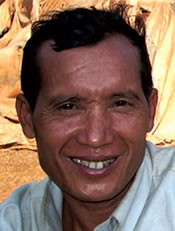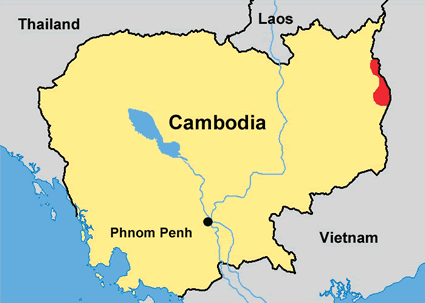The Jarai are a minority group living in northeastern Cambodia and the Central Highlands of Vietnam. They have inhabited these areas for thousands of years. The small Jarai community in Cambodia maintains unofficial links with 300,000 Jarai kinsmen in Vietnam. Unlike all of the other indigenous minorities in Cambodia, the Jarai language is not related to Khmer. Rather, it is distantly related to the languages spoken in the island nations of Malaysia, Indonesia, and the Philippines.
Most Jarai engage in subsistence agriculture, growing rice and vegetables in small plots cut out from the forest. Their diet is further supplemented by hunting, fishing, and gathering wild foods from the forest. These sources are diminishing with increased population and environmental degradation. Traditional Jarai villages are made up of twenty to sixty longhouses, partitioned into quarters for individual family units, and are not mixed with families of other language groups. Jarai society is matrilineal. Marriage is normally initiated by the bride's family, and newlyweds typically live with the bride's family. Frequent intermarriage and trade between speakers of other languages leads to a high degree of multilingualism.
Like other minority groups in the area, Jarai religious beliefs are animistic. Objects in the natural world - trees, mountains, rivers, etc. - are believed to be inhabited by spirits. People are compelled to make sacrifices to appease the spirits in case of illness and to gain favor for good crops. Great significance is placed upon spirits who own and protect certain territories. When traveling, animist Jarai typically offer sacrifices seeking protection and safety from the spirit governing their new location. This practice causes many Jarai to fear traveling far from their homes.
Before 1975, Christian missionaries in Vietnam planted a few churches and translated the New Testament. The church has continued to grow, spreading to Cambodia in the 1990s. Today a significant minority of Jarai people, and even entire villages are known as Christian. Although Jarai in Cambodia speak a different dialect, they are able to make some use of the Bible and the literacy materials that were produced in Vietnam in the early 1970s.
The Jarai live in the most remote part of Cambodia, cut-off from public education, modern health care, roads and communications. This is beginning to change, but along with roads and mobile phone towers come people seeking land and other resources. Difficulties in dealing with these new outsiders make the Jarai open to exploitation. Pray for the young Jarai church in Cambodia, that they will understand and apply the Scriptures, enabling them to be an effective light in their communities, affecting their culture for Christ.
Scripture Prayers for the Jarai in Cambodia.
| Profile Source: Cambodia Research Network. Click to email CRN inquiries and corrections Copyrighted © Used with permission |











